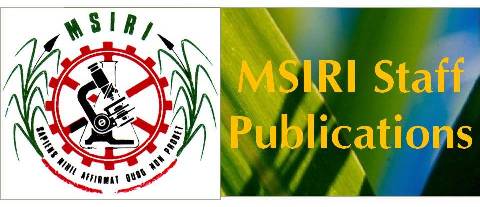Investigations on family and genotype adaptation to two water regimes in sugar cane, and relevance to breeding and selection policies
| MSI99P0044 | |
| Domaingue, R. | |
| University of Wales, GB | |
| Investigations on family and genotype adaptation to two water regimes in sugar cane, and relevance to breeding and selection policies | |
| Thesis, MPhil | |
| Thesis | |
| 1989 | |
| 173 p. | |
| En | |
| En | |
| Sixty-two sugarcane genotypes from each of six biparental (single-paired) crosses were grown with and without irrigation in a sub-humid zone (1340 mm) of Mauritius. Tillering and stalk elongation were assessed at different intervals, in plant cane (1985-86) and first ratoon (1986-87) crops. At both harvests number, diameter, and height of cane, number and length of internodes, brix, pol per cent cane, pol per cent dry matter, fibre per cent dry matter, dry matter per cent, volume ("yield") of cane and of pol were measured or computed. Total leaf water potential was measured during a dry spell, and cell membrane stability was unsuccessfully assessed. "Yield" and its components, except pol, were generally reduced under drier conditions, greatest reduction being for cane height, number and length of internodes. Pol was greater in unirrigated. Families and genotypes within each family were contrastingly different for all characters. The family x treatment and genotype x treatment interactions were not significant at P 0.05 although some degree of specific adaption was detected for cane diameter, cane number and length of internode by differential selection studies. Total leaf water potential was lower in unirrigated cane and differences between families were smaller in this growing condition. Genetic variances of individual families were slightly larger in unirrigated conditions and more contrastingly different for cane diameter and cane number and pol per cent cane. The broad sense heritability estimates were low in both growing conditions, and more divergent for diameter, brix and pol per cent cane in unirrigated cane. Regression analyses did not establish different association between progeny and parents in different growing conditions. The coefficients were very large for cane height and much smaller for cane number. The relevance of the results to breeding and selection policies are discussed. | |
| SUGARCANE RESISTANCE ENVIRONMENTAL FACTORS BREEDING SELECTION | |
| MAURITIUS | |
| Cane breeding and genetics | |
| Breeding for tolerance to environmental stress | |
| 1991-10-28 | |
| En | |
| Mauritius Sugar Industry Research Institute | |
| PB |
